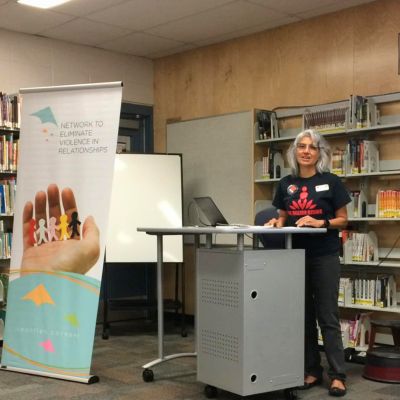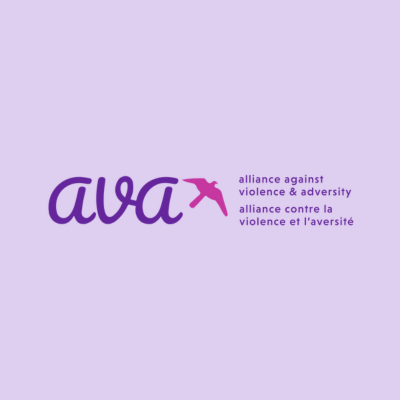01.
Public Education
Toolkits & Workshops
One of NEVR’s ongoing projects is educating the public on how to recognize and respond to abuse. We do this by creating toolkits and facilitating workshops.
To date, we have created seven toolkits available to the public for free. These are continuously updated.
- Violence Intervention Program
- Early Years Toolkit
- Healthy Relationship Pre-Teen Toolkit
- Healthy Relationships Young Adult Toolkit
- Violence Screening Toolkit for Health Care Providers
- Men Who Suffer Abuse Toolkit
- Addressing Relationship Violence Experienced by International Students
Our workshops are held throughout the year. Visit our events page to see when the next workshop is.
To book a session with a facilitator, contact us.

02.
AVA
BC System Map
Alliance Against Violence and Adversity (AVA) is a national initiative formed to enhance training and research to address violence against women, girls, gender-diverse people.
As a member of AVA, NEVR’s goal is to help highlight what is happening within BC in relation to the gender-based violence plan. We are adding to this work by creating a system map of what our members are doing to prevent and address relationship violence.
By sharing our toolkits and creating system evaluation measures, we can assess if the system as a whole is moving in the right direction.

03.
Publications
Our publications offer comprehensive materials for program facilitators, participants, and communities.

Learning Brief on Evidence Based Prevention
Using the evidence from brain science and toxic stress, a learning brief outlines the need for integrated actions across ministries and NGOs.
Literature review: Relationship Violence in Youth
This scoping review reports on the existing literature published in the past two decades (2003- 2023) on relationship violence against and among children under 18 years old.
The research is extensive in this field, and it points to the ways in which Adverse Childhood Experiences have long-lasting impacts on the well-being of individuals and lead to their engagement in and/or exposure to aggressive and violent behaviours across the lifespan. There is a substantial body of literature maintaining that child abuse, as a form of Adverse Childhood Experiences, contributes to a transgenerational transmission of violence.
Making Sense of a Global Pandemic: Relationship Violence & Working Together Towards a Violence Free Society 2nd Edition
This on-line book, updated in 2024, provides a wealth of information on relationship violence focusing amongst other things on: definitions, the scope of the problem, theoretical frameworks, interventions and prevention strategies. It provides information on legal statutes (Provincial; Federal and International) and contains numerous links to additional resources to inform the reader.
The book also highlights some emerging issues such as the importance of cultural safety, relationship violence in the workplace and on post-secondary campuses, gang violence, and structural violence.
Knowledge Synthesis – Survivors of IPV and Likelihood of Being Re-Victimised
This commissioned research is a knowledge synthesis of the contextualisation and integration of research findings on the likelihood of survivors of IPV being revictimized. It is a combination of both qualitative and quantitative research studies.
Eighty-two studies have been used to reach the conclusion that there are no pre-existing tools/measurements to assess the likelihood of a person being revictimized in relation to interpersonal and in particular, sexual violence. This knowledge synthesis is a first step and can help with the creation of a tool.
Learning Brief on Integrated Courts
This is a learning brief on the pros and cons of the current Provinical Family and Criminal court systems in BC and the pros and cons of the Integrated Domestic Violence Court system in Ontario.
An Evaluation of the B.C. Violence Against Women in Relationships (VAWIR) Policy
This paper evaluates BC’s Violence Against Women (VAWIR) policy, specifically the way that the police and Crown Counsel, not the victim, decide whether charges should proceed in intimate partner violence (IPV) cases. This paper demonstrates that despite best intentions, the VAWIR policy upholds patriarchal attitudes towards victims of IPV and can harm rather than help victims, especially those who are immigrants.
KPU Faculty Report on Gendered Violence
This report shares results of the Faculty Survey on Sexism and Inappropriate Behaviours at KPU that was conducted in the Fall 2023 by Dr Cherylynn Bassani (Sociology Department, KPU; Status of Women Representative, KFA).
Elder abuse in the 2SLGBTQ+ community
This knowledge synthesis reviews published research on 2SLGBTQIA+ elder abuse from 2012 onward, drawing on studies from Canada and other countries including the U.S., U.K., Australia, South Africa, and New Zealand. Most of the existing literature is quantitative and centered on healthcare settings.
The findings highlight that 2SLGBTQ+ older adults often face a continuum of abuse and discrimination throughout their lives—from childhood trauma to mistreatment in end-of-life care. Documented forms of abuse include physical and psychological harm, neglect (including self-neglect), financial exploitation, and sexual abuse. Many older adults also report fearing neglect if their sexual orientation or gender identity is disclosed, and experience ongoing microaggressions that contribute to a hostile care environment.

